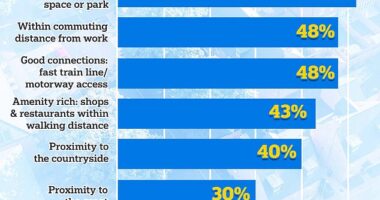
Shares in JD Wetherspoon plunged almost 20 per cent after the British pub chain crashed to its first loss in 36 years.
As boss Tim Martin warned that ‘erratic’ coronavirus restrictions were hammering the hospitality industry and wider economy, his company posted a 30 per cent fall in annual revenues to £1.3billion.
The upheaval tipped Wetherspoons to a £34.1m loss for the year to July 26, compared to a £102.5m profit in 2019, after the pandemic temporarily closed its venues and sent costs soaring.


It was the first time it had gone into the red since 1984, the year after it was started, when it recorded a £7m loss.
Shares fell 19.4 per cent, or 186.5p, to 773.5p, reducing its market capitalisation from £1.2billion to £931m.
And Martin warned that he could not hold back from job cuts for much longer, claiming the Government’s latest curbs made the future ‘even more unpredictable than hitherto’ for pubs.
At a press conference, the 65-year-old repeatedly criticised the ‘ill-thoughout’ rules, quoting investor Warren Buffett, musician Bob Dylan and former Supreme Court judge Lord Sumption.
He said venues adapted to social distancing after lockdown measures were eased in the summer, but since then ministers had panicked and ‘started shooting from the hip’ with changes that had no ‘obvious basis in science’.
The 10pm curfew and rules confining pubs to table service had been ‘particularly damaging’, Martin said, because they pushed up costs and put off customers who ‘find it too much of a faff’.
He claimed hospitality businesses were being unfairly targeted, insisting that there had been only single cases of the virus at 116 of Wetherspoons’ venues, while 670 had no cases at all.
‘You would think if it was ripping through the pub world, you would not have just had 116 pubs with one,’ Martin said. ‘It makes no sense for supermarkets to be treated more leniently than pubs, since pubs generate far more jobs per pint or meal than supermarkets, as well as far higher levels of tax.
‘Pubs also make an important contribution to the social life of many communities and have better visibility and control of those who consume alcoholic drinks.’
Martin said he was ‘not belittling Covid-19 in any way’, adding it was ‘tremendously serious’. He said: ‘The truth is you certainly can catch Covid in a pub, but it is not the centre of transmission.’
His warning came as the British Beer and Pub Association said ‘survival hangs dangerously in the balance’ for thousands of pubs in Lancashire, which joined Liverpool in the highest level – Tier Three – of restrictions.
It said there were roughly 1,200 pubs employing 23,000 people in Lancashire and another 1,000 employing 21,000 in the Liverpool City Region. Emma McClarkin, the association’s boss, said the changes would ‘completely kill the business model’ of hundreds of pubs.
She added: ‘Support needs to be made available to brewers and the wider supply chain businesses also seeing their custom taken from them overnight.
‘We desperately need this if we want our local pubs to survive.’









